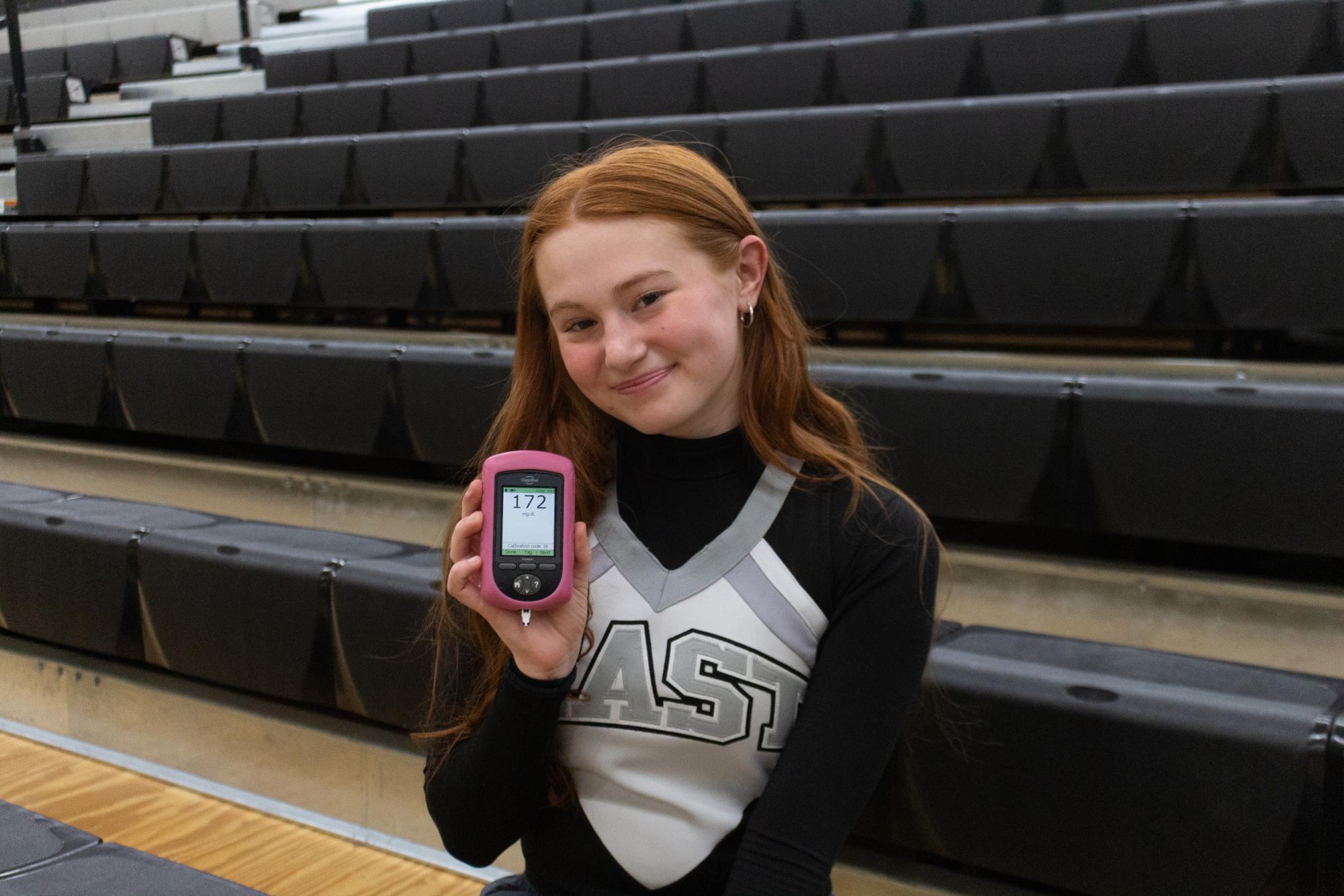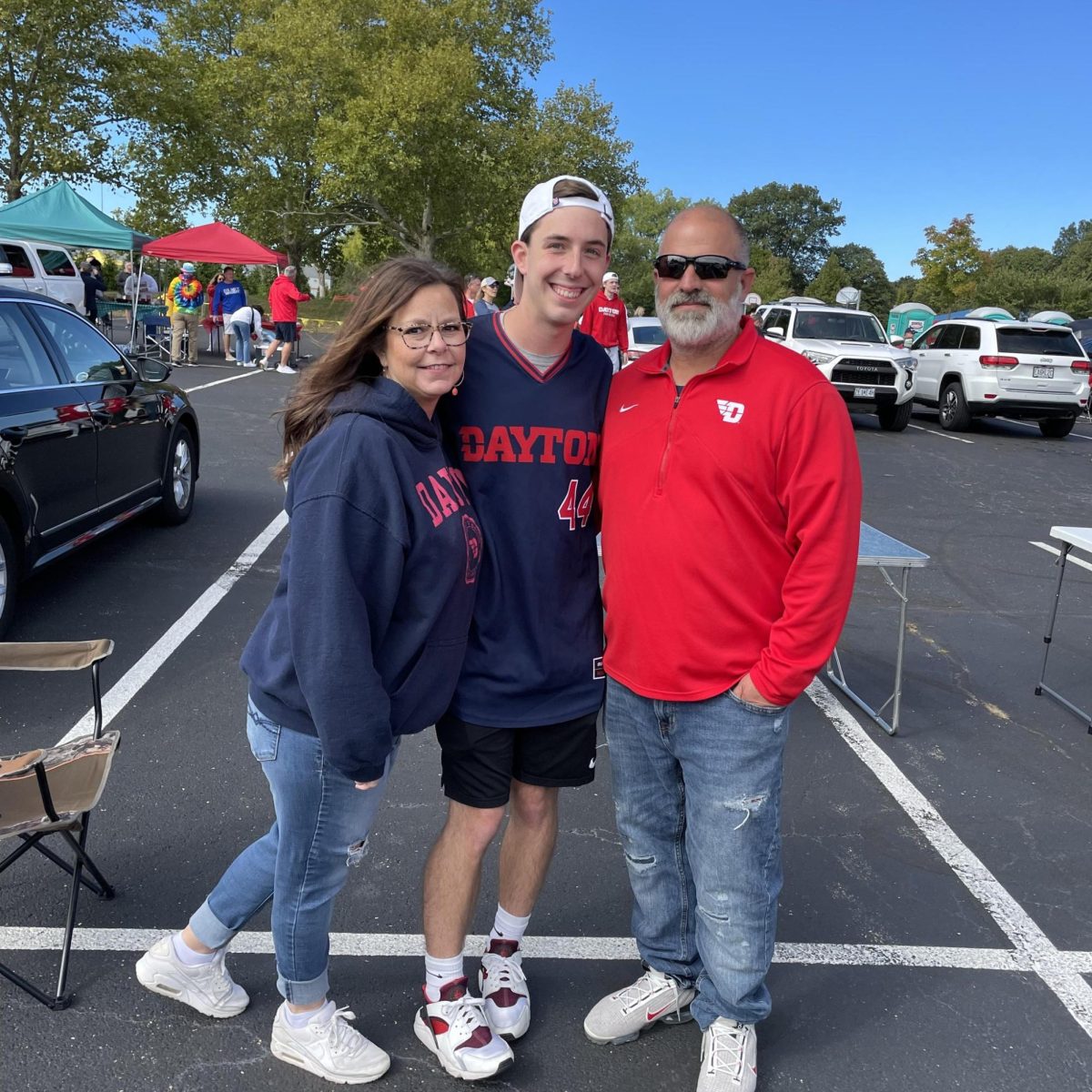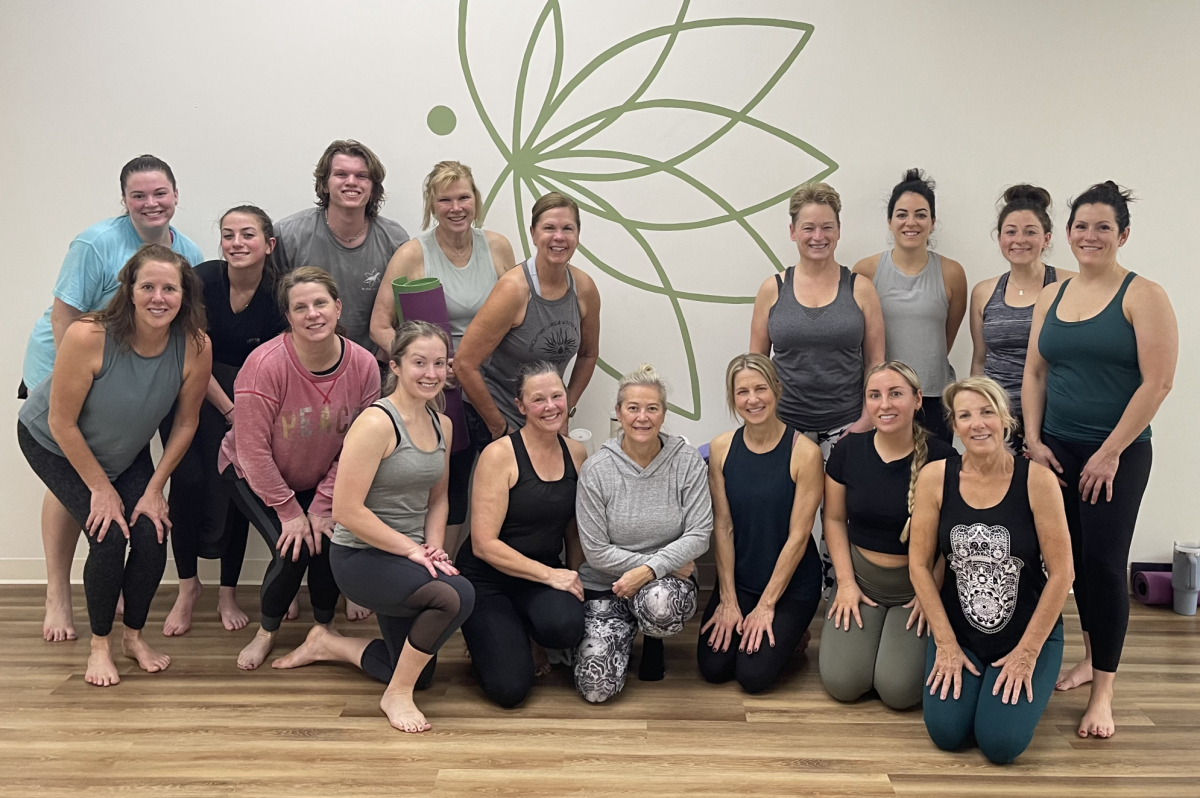When the bell rings, students flood the cafeteria, pick a bench, and sit down. Immediately tearing into their food. After hours of learning, hunger has set in. But not everybody is allowed to immediately enjoy the relief of lunch. Unlike everyone else, Riley Dexter began preparing for lunch about 20 minutes ago, when she pulled out her Dexcom device in class and inputted the required amount of insulin to enjoy a full lunch. Now that she is seated at a lunch table, she checks the Dexcom app on her phone, sees that her sugars are stable, and allows herself to take a bite of food.
Dexter’s mom, Wendi Dexter, says that Riley was diagnosed with type 1 diabetes (T1D) on Nov. 9, 2009, when she was three years old. When she learned of Riley’s diagnosis, she was overwhelmed with feelings of grief, anger, and fear.
Riley says that her diagnosis was not a quick find for doctors. Having a twin sister, her mom was able to see visible differences in the girls’ weight and growth.
“I was losing a lot of weight; my skin was jaundiced; it was turning yellow, and I was potty trained, but I still would have to go to the bathroom all the time. It was uncontrollable,” Riley told Spark. I got to the point where I was at such a severely [low] weight that I had to go on a certain regime, and my mom said, ‘This isn’t normal’ so I went to the doctor probably like three different times. They said it was the flu, it was just a sinus infection, and my mom still knew there was something wrong so she ordered a blood test.”
Upon receiving the blood test results, Riley was immediately admitted to the hospital because her blood glucose levels were 957 mg/L. The typical blood sugar glucose for a child under five is 71-180 mg/L.
“It was a traumatic experience. I remember being in the hospital because I was in there for a few weeks, and I remember the adjustment of easing into pre-school because my teachers didn’t know how to take care of me,” says Riley. “It’s a lot to take care of a newly diagnosed diabetic, especially in a time where there weren’t accessible insulin pumps. I had to wait a year before I could even get one. It was not super feasible for my teachers to have to give me injections.”
When Riley was first diagnosed, different treatment options, like an insulin pump, weren’t readily available, so she had to endure manual insulin injections each time she wanted to eat or her sugars were high. Riley now has the Dexcom G6, which is a device that provides glucose readings every five minutes. She also has an Omnipod 5, which is the only tubeless automated insulin delivery system. The Omnipod 5 communicates with her Dexcom G6 every five minutes and predicts where her glucose levels will be in the next 60 minutes. It also communicates these readings with an app on her iPhone, allowing her easy access to her glucose levels at all times.
“I know that the attention had to be on me for a while, and it was a huge shift in the family dynamic because they were used to everything being more balanced, but then they had to watch me a lot more,” says Riley. “They had to be with me a lot more than they were used to before. They had to have more time dedicated to one child rather than the others.”
Wendi says that it was very difficult to adjust to Riley’s diagnosis as nobody in their immediate family has T1D. She says that it took her about six months to adjust to Riley’s diagnosis.
“Having a diagnosis that could be life-threatening, I believe Riley has had to be responsible and mature sooner than most children her age. She hasn’t looked at type 1 diabetes as a negative, but as a positive in her life for accomplishing things when she could have been negative and not accepted being a type 1 diabetic,” Wendi told Spark.
Riley is on the East High School’s cheer team; she is the Vice President of East’s (Junior State of America (JSA) Chapter, she is the Ohio River Valley Junior State of America, (ORV JSA) Fundraising Specialist, and she is an active participant in the theater program, most recently being cast in East’s production of Mamma Mia. For years, Riley has been an ambassador for the Juvenile Diabetes Research Foundation (JDRF), the leading organization globally for research, advocacy, and community engagement to advance breakthroughs in Type One Diabetes research. JDRF works to raise money to find a cure for T1D, to support juveniles with T1D, and to raise awareness for T1D.
“My job is to basically spread awareness of T1D and also the impact of JDRF. JDRF is a nonprofit that funds research for the cure of type one diabetes,” says Riley. “My job as an ambassador is to go to events and let people know ‘hey, I’m diabetic and this is what my life is like’ and it’s not super different than the life of a typical teenager, but there’s definitely some changes that I have had to make in my lifestyle, and I want them to be aware of that. And then also just fighting misconceptions about type 1 diabetes, so that together as a community people can be aware of what T1D really is.”
Riley says that she is not technically an ambassador for JDRF at the moment, but they have asked her to come back two years in a row. She says that there is supposed to be a year-long gap between each ambassador term to give other people a chance to be ambassadors, but after COVID there was a lack of engagement, so they asked her to come back. She has served as an ambassador for JDRF in sixth, ninth, and tenth grades.
While Riley lives life just like any other teenager, T1D can complicate things. It can get in the way of sports and exercise. When she is practicing for cheer or cheering at a game, sometimes her blood sugar levels force her to sit out.
“Sometimes I have to sit down and wait for my blood sugar to go up, and it can be really frustrating having to miss out on the content that I’m learning. Also, if I try to power through it, my performance is so much worse than normal, and I just want to be able to go straight into it. I have to take carbs, wait 15 minutes for my blood sugars to go up, and then wait another 15 minutes to fully feel better,” says Riley.
Riley’s cheer coach, Allison Korson, says that Riley has always been very responsible with her health and therefore does not require extra attention at practice or in games.
“She did inform me early on, and with that, I would try to watch out for her, but she was able to tell me when she wasn’t feeling well, needed to sit down, or needed a snack. It was few and far between and did not affect her keeping up with the team. She always was giving 100% effort,” says Korson, who met Riley in 2021 and has been her coach for three years.
She says that Riley is an “amazing teammate.” Riley leads others on the team by example by showing them her desire to improve daily.
“She cares about others genuinely and wants them to succeed as well. Riley’s attitude is one I wish everyone would have,” says Korson.
Korson describes Riley as smiley, hardworking, and “intentional.” She says that the thing she admires most about Riley is her determination. She says that no matter what, Riley always works hard to make things as perfect as possible, never settling for just okay.
“Riley got injured at one of the last practices of football season. The stunt did not go as planned, and she landed unfortunately on her foot, twisting it and causing a lot of pain,” says Korson. “She proceeded to have a wonderful attitude even through the pain and did everything she could to still cheer and be a part of our game day. Riley continued with a smile on her face, not feeling sorry for herself, or being upset with others. This is a small example of her perseverance through trials, and her desire to keep getting better, even with a boot on her foot!”
Though those close to her fondly describe Riley as determined and hard-working, Riley says that others often have misconceptions about her. She says that sometimes people see her as lazy when she needs to sit out. She says that it can affect her mental health structure because her blood sugar and glucose levels are always right in front of her, and when she isn’t in the correct range, it makes her feel “out of control.”
“When I have low blood sugars or high blood sugar it can still affect me for the next couple of days and make me feel not my best, especially after exercise. Sometimes you can go higher immediately after exercise, and then 24 hours later your blood sugar is dropping and you don’t always think about the factors or the activities that you were doing, you just think at the moment you were doing a bad job,” says Riley.
According to Riley, misconceptions and mundane struggles regarding T1D are common, whether it be people falsely viewing her as lazy, people approaching her regarding false cures, or restaurants giving her regular soda rather than diet soda.
“I used to work at a nail salon, and one of my coworkers would tell me that I could eat cinnamon and my diabetes would be cured. It was just really exhausting having to explain that. First of all, I have type one, and second, that won’t clear any type of diabetes,” says Riley.
Though she is very secure now and even helps to educate and support others, Riley struggled with feeling isolated due to her diagnosis in elementary school. The elementary school nurse would pull Riley out of class constantly, whether it be to check her ketone levels or give her a snack for her sugars. On a typical day, she would pull Riley out before lunch to make sure she was correctly managing herself before eating.
“I felt very different because I spent hours in the nurse’s office every single month. I would have alarms go off on my pods, and I would have to run and get it checked out. It was something that was completely foreign; nobody else ever did that. I just felt completely different than everyone else,” says Riley.
Looking towards the future, Riley hopes to one day land a spot on the JDRF children’s council. She has gone through the rigorous application process each year for years but has never been accepted. The JDRF children’s council travels to Washington, D.C., speaks on behalf of T1D, and educates Congress on their concerns and needs, as the group isn’t very well recognized in legislation.
“Making sure other people are aware of your situation can help fight ignorance. Speaking up for yourself is important, making people aware, and there’s a lot of other people dealing with similar situations you just might not be able to tell,” says Riley.
Riley Dexter FULL PAGE infographic (assembled)







